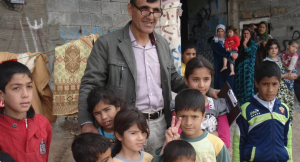While 12,000 Syrian refugees will set foot on Australian soil in the next six months, millions more who have fled their homes in both Syria and Iraq will never be classified as refugees and will likely never make it out of the war-torn countries.
When the Australian government announced early this month it would take 12,000 Syrian refugees, it said it would give priority to those registered with the United Nations refugee agency, the UNHCR, in Jordan, Turkey and Lebanon. It also said it would prioritise persecuted minorities like Christians and the Yazidi.
But it is Christians and other vulnerable minorities who are most likely to be stuck within their own country, say Christian organisations including Barnabas Fund, Act For Peace and the Australian Christian Lobby. They won’t be registered with the UNHCR as refugees because they haven’t crossed an international border. They are IDPs: internally displaced persons who still fall under the protection of their home governments.
Approximately 40 per cent of Syria’s population has been internally displaced by the ongoing conflict. That’s 7.6 million people. Over a million of those were displaced in 2014 alone. 2014 was even harder for Iraqis, with 2.2 million people forced to flee from areas seized by Islamic State to other parts of Iraq.
The head of Bible Society Lebanon, Mike Bassous, who also oversees the work of the Society in Iraq and Syria says Christians in Iraq have been displaced four or five times in the last 30 years. Thousands have now fled to places like Erbil and Dohuk, which, though in the Kurdish region, are still within Iraqi borders.
They can’t go back to their homes. And they can’t move on.
“Many of them will never be able to leave Iraq – for financial reasons or … they don’t have family connections outside Iraq. This is a fact that they have to remain there,” said Mr Bassous.
Barnabas Fund, an organisation providing practical aid for persecuted Christians, is urging the Australian government to consider granting humanitarian visas for internally displaced people as well as those with refugee status. It has also started a petition, here. Earlier this year Barnabas Fund worked with the government in Poland to help get visas 158 internally displaced Syrian Christians, who are being resettled in Warsaw.
“The majority of Christians in Iraq and Syria are caught living in makeshift housing for the internally displaced. They can’t go home. And the already treacherous journey to cross international borders is made more difficult by continued threats against their Christian faith,” said Barnabas Fund’s chief operating officer in Australia, Jude Simion.
The Australian Christian Lobby added its voice to calls for the Australian government to remember those Christians who are trapped within Syria and Iraq.
“It is simply not possible for people who are internally displaced and fleeing Islamic State fighters who want to cut their heads off to cross a national border to become refugees,” said ACL’s managing director Lyle Shelton. “If the Polish government is able to find a way to grant refugee visas to internally displaced people, surely the Australian government can too.”
Alistair Gee, executive director for Act For Peace, the international aid agency of the National Council of Churches, agrees that considering IDPs for visas is a line worth pushing.

A group of Christians whose families have fled their homes, outside makeshift housing in Erbil in northern Iraq. Photo: Bible Society
“It’s more difficult for Christians and other religious minorities to get out,” Mr Gee told Eternity. “It’s a risky passage, often leading past Islamic State strongholds. Many are afraid to risk that journey.”
Mr Gee says not only do many Christians feel the risks are too great to attempt the difficult passage out of Syria or Iraq, if they do make it out, they don’t feel safe in the refugee camps.
“Christians [in the Middle East] feel a certain safety in numbers,” he said. “So if there are no or few Christians in the refugee camps, they won’t want to be there either. Any refugee camp near a war zone is going to have ethnic and religious difficulties. You can’t secure these places and they are highly tense areas. There’s a lot of people in trauma so it’s not surprising that Christians don’t want to risk their lives to make it out of Iraq or Syria and then find themselves in a camp where they also don’t feel safe.”
The United Nations refugee agency, UNHCR calls internally displaced people, or IDPS, “among the world’s most vulnerable people.” The United Nations is appealing to governments around the world to provide their fair share of aid for the protection of vulnerable communities in-country. Mr Gee from Act For Peace says protection plans are 70 per cent underfunded.
“We’re calling on the Australian government to provide their fair share of aid for protecting vulnerable communities, including Christian communities, inside Syria and Iraq.”
Along with accepting 12,000 Syrian refugees into Australia, the government also announced a $44 million aid package for refugee agencies. Act For Peace says that’s a good start, but more must be done for those that remain inside Iraq and Syria.
“The Australian Defence budget has set aside $650 million this year for its Iraq operation of air strikes, training and an embassy upgrade. We have also now provided $700 million for resettlement of 12,000 refugees. Finding more to better protect [those still within Iraq and Syria] is certainly affordable.”
Email This Story
Why not send this to a friend?

